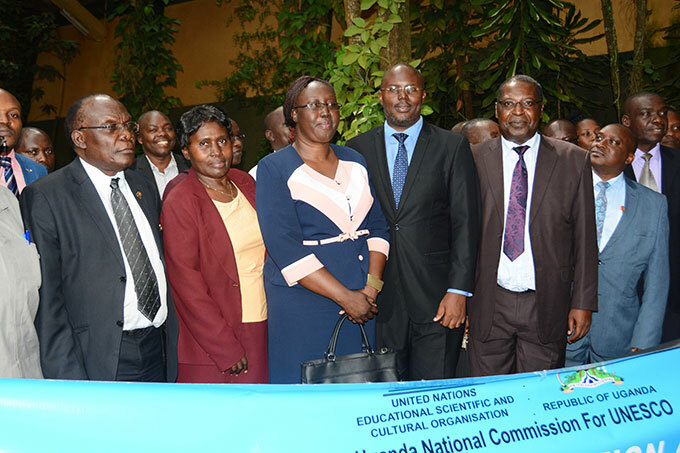Govt urged to implement UN position on sciences
The UN position was established in 2014 by the then UN secretary general, Ban Kimoon and it states that science be valued more highly, employed more widely and used effectively at all levels.
EDUCATION
KAMPALA- The Government has been urged to implement the UN position on science subjects in order to achieve sustainable development goals (SDGs).
The call was made by Dr. Dominic Mundrugo, the Uganda National Commission (UNATCOM) for UNESCO deputy secretary general.
"Science, technology and innovation can help narrow economic and opportunity gaps and be game changer in dealing with nearly all the most pressing global challenges and play key role in achieving SDGs," Dr Mundrugo stated.
Dr Mundrugo made remarks during the consultative meeting organised by UNATCOM for UNESCO to address the declining performance of science subjects at Forest Cottages in Kampala.
 Participants pose for a group photograph during consultative workshop on improvement of science education at Forest Cottages in Kampala. (Photo by Francis Emorut)
Participants pose for a group photograph during consultative workshop on improvement of science education at Forest Cottages in Kampala. (Photo by Francis Emorut)
The meeting was attended by scientists, education experts and top planners of education in the country.
He said natural science covers almost all the 15 SDGs.
The UN position was established in 2014 by the then UN secretary general, Ban Kimoon and it states that science be valued more highly, employed more widely and used effectively at all levels.
"As long as science is seen as farfetched and unattainable, we shall continue to see students who fear to take science subjects and those who take know they are going to get F9," Rosie Agoi the secretary general of UNATCOM told participants.
She emphasised the need to recruit committed science teachers and motivate them to increase enrolment in science subjects and address poor performance.
Moses Ebong an official from the energy ministry was critical of government for not carrying out public awareness on the importance of science subjects saying no wonder they are low enrolment rates.
"There is lack of public awareness about the science subjects, it's only left to the teacher alone who also doesn't know all the applicability of science," Ebong told participants.
The permanent secretary at the Ministry of Education, Alex Kakooza emphasised that without investment in science education Uganda's priority development areas such as tourism, agriculture and oil, gas and minerals will not be achieved because all sectors are science based and science and technology driven.
His remarks were presented by Patrick Muida the education spokesman.
Prof Eriabu Lugujjo, vice chancellor of Ndejje University, attributed the declining enrolment in science subjects to lack of committed teachers and laboratory equipment.
"It requires professionalism, passion, commitment and sacrifice to teach science subjects," Prof Lugujjo said.
Gerald Muguluma an official from Secondary Science Mathematics (SESEMAT) programme advised UNEB to implement the curriculum and ensure supervision of science teachers to increase enrolment.
Josephine Mutonyi Othieno, senior examinations officer at UNEB told participants the causes of low enrolment in sciences among students include; negative attitude towards the sciences and discouragement by the parents, teachers and community, the poor science background at ordinary level and lack of laboratory equipment.
To address the problem Mutonyi suggested that Uganda National Council for Science and Technology should establish motivating centres like the science museum.
In 2003 government made science subjects compulsory at ordinary level but not much effort has been done to popularise and make it attractive to students.